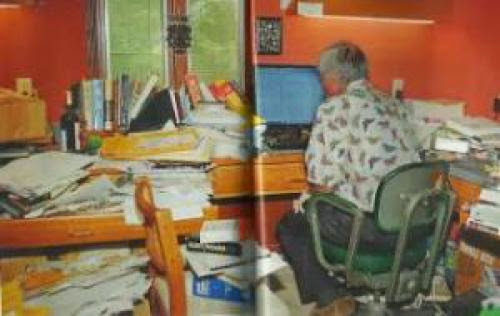
The November issue of "THE ATLANTIC" (magazine) has an article by James Somers entitled "The Man Who Would Teach Machines to Think" - Douglas Hofstadter. [Page 90 ff.]
This is a picture of the brilliant Hofstadter, in his study and at his desk - a place not unlike my own (and probably not unlike many of yours):
The article doesn't have a thing to do with UFOs but there are some insights that are germane.
Somers notes that the author of the Pulitzer Prize winning G"oDEL, ESCHER, BACH: AN ETERNAL GOLDEN BRAID (which you have in your library, or should), Douglas Hofstadter is now 68 years old; he was 35 when he received the Pulitzer for his non-fiction book.
Hofstadter is a professor at Indiana University, and Somers' article is about how Hofstadter no longer is pertinent to computing's search for Artificial Intelligence; the programming genre has passed him by.
This is where the UFO connection comes in.
Kevin Randle, Stanton Friedman, Jerry Clark, and a few others you can name, are no longer relevant to UFOs (or ufology, if you like), replaced by time, and younger UFO turks, like Nick Redfern and Paul Kimball.
Hofstadter remains knowledgeable about AI, in ways that others are not. This is true of Messieurs Randle, Friedman, Clark, et al. also. They know more about UFOs than others in the field.
But no one is listening to them, just as AI technicians at Google and other computing venues ignore Hofstadter.
Hofstadter is really interested in cognition, consciousness, and the process of thinking.
The UFO guys - the geezers named here - are interested in what UFOs are but they, like Hofstadter, are wedged in the wall of old UFO tales (as am I). Evidence for that can be found at the current ramblings online at Mr. Randle's blog, and the restraint of Mr. Friedman lately (because of age and a non-responsive audience), and Mr. Clark, whose UFO palpitations are skewed by his occasional participation in wayward discourse at UFO UpDates.
Somers notes that "The entire effort of artificial intelligence is essentially a fight against computers' rigidity." [Page 96]
And in ufology, that is what youngsters deal with: the rigidity of the UFO old guard.
The geezers haven't heeded what writer Somers provides from Dave Ferrucci, a member of the IBM Watson (computer) team:
'There's a limited number of things you can do as an individual, and I think when you dedicate your life to something, you've got to ask yourself the question: To what end?"[Page 98]
What was or is the purpose of the ongoing study of UFOs by Randle, Friedman, Clark and even myself, or you?
Hofstadter said "I don't need the stimulation of the outside world," a mantra I like and Paul Kimball says he adheres to, although his Facebook page tells us otherwise, but his UFO interest has, indeed, internalized pretty much.
But Somers cautions that "... if you don't participate in the fight, in the rough-and-tumble of academia [insert "ufology" here], your ideas are going to end up being sidelined by ideas which are perhaps not as good, but were more ardently defended in the [UFO] arena." [Page 100]
(This is why skeptics get a foothold now and then. The UFO faithful give way to the rabid arguments of UFO skeptics because the faithful, like Hofstadter, step aside:
"I don't enjoy going to conferences and running into people who are stubborn and convinced of ideas I don't think are correct, and who don't have any understanding of my ideas." [op. cit]
Me? I'm pushing back....some skeptics are irrational and foolish. I've banned them from my life, keeping intact those who are moderate and intelligent: CDA, Lance Moody, and, sometimes Tim Printy or Zoam Choamsky.
Go to "THE ATLANTIC" online, and seek out the Somers' piece, especially if you are into computerings' artificial intelligence, but also to see how a great thinker, Hofstadter, has dealt with his academic love and life in general.











0 comments:
Post a Comment